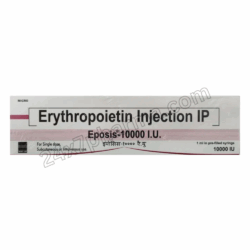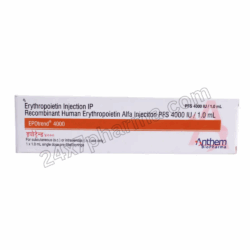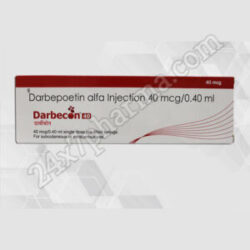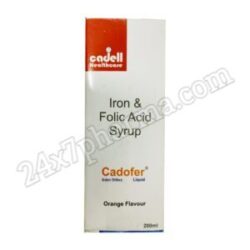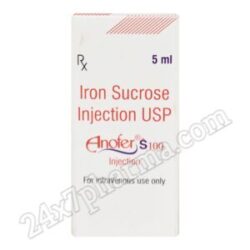What is Epotrend 2000 IU Injection?
Epotrend 2000 IU Injection is a medication used to treat a condition called anemia, particularly in individuals with chronic kidney disease or those undergoing chemotherapy. It contains the active ingredient Epoetin Alfa, a synthetic version of erythropoietin, a natural hormone produced by the kidneys. This hormone is crucial for stimulating the production of red blood cells in the bone marrow. Epotrend 2000 IU Injection is used when the body does not produce enough erythropoietin, leading to low red blood cell counts, which can cause fatigue, weakness, and shortness of breath. This injection is administered under medical supervision and helps restore red blood cell levels, reducing the need for blood transfusions.
How Does Epotrend 2000 IU Injection Work?
Epotrend 2000 IU Injection works by mimicking the action of erythropoietin, a hormone that stimulates the bone marrow to produce more red blood cells. In patients with anemia, particularly those with chronic kidney disease or cancer, the body’s ability to produce sufficient erythropoietin is impaired. As a result, red blood cell production decreases, leading to symptoms of anemia such as fatigue and weakness.
Epoetin Alfa, the active substance in Epotrend, binds to erythropoietin receptors on the surface of precursor cells in the bone marrow, stimulating them to divide and mature into functional red blood cells. This increases the number of red blood cells in circulation, helping to alleviate the symptoms of anemia. The injection is particularly effective in patients undergoing dialysis or chemotherapy, where anemia is a common side effect. By boosting red blood cell production, Epotrend 2000 IU Injection improves oxygen transport throughout the body, enhancing energy levels and overall quality of life for affected individuals.
Uses of the Epotrend 2000 IU Injection
Epotrend 2000 IU Injection is prescribed for several medical conditions where red blood cell production is compromised. The primary uses include:
- Anemia Due to Chronic Kidney Disease (CKD): Patients with CKD often have reduced kidney function, which limits their ability to produce erythropoietin. Epotrend is used to stimulate red blood cell production in these patients, reducing the need for blood transfusions.
- Anemia in Cancer Patients Undergoing Chemotherapy: Chemotherapy can damage bone marrow, leading to decreased red blood cell production. Epotrend helps to manage chemotherapy-induced anemia by promoting red blood cell formation, thereby reducing the symptoms of fatigue and weakness associated with low hemoglobin levels.
- Anemia in Patients Undergoing Dialysis: Dialysis patients are prone to anemia due to the loss of red blood cells during the dialysis process. Epotrend helps to replenish these cells, preventing severe anemia and improving patient outcomes.
- Prevention of Anemia in Premature Infants: In some cases, Epotrend is used to prevent anemia in premature babies, who are at higher risk due to underdeveloped bone marrow.
- Surgery Patients: In certain surgical procedures, particularly those involving significant blood loss, Epotrend may be administered to stimulate red blood cell production before surgery, reducing the need for transfusions.
Other Dosages
Here are some common dosages of Epotrend injections:
Side Effects of Epotrend 2000 IU Injection
While Epotrend 2000 IU Injection is effective in managing anemia, it may also cause certain side effects. It’s important for patients to be aware of these and consult their healthcare provider if they experience any. Common side effects include:
- High Blood Pressure: An increase in red blood cells can elevate blood pressure, especially in patients with pre-existing hypertension. Monitoring blood pressure during treatment is essential.
- Headache: Some patients may experience mild to severe headaches, which are usually temporary but should be reported if persistent.
- Injection Site Reactions: Redness, swelling, or pain at the site of injection may occur but typically subsides after a few hours.
- Joint or Bone Pain: Some individuals report experiencing bone or joint discomfort as a side effect of increased red blood cell production.
- Blood Clots: In rare cases, Epotrend may increase the risk of blood clots, particularly in patients with existing cardiovascular issues. Symptoms such as swelling in the legs, chest pain, or shortness of breath should be addressed immediately.
- Reactions to allergens: While uncommon, allergic reactions might manifest as rash, irritation, or swelling. Serious reactions that cause breathing difficulties need to be treated right away by a doctor.
Warnings & Precautions
Before using Epotrend 2000 IU Injection, it is important to consider certain precautions and warnings to ensure safe usage:
- Hypertension: Patients with uncontrolled high blood pressure should not use Epotrend as it may exacerbate the condition. Blood pressure must be regularly monitored throughout treatment.
- Heart Disease or Stroke: The increased red blood cell count can lead to a higher risk of cardiovascular events. Patients with a history of heart disease, stroke, or clotting disorders should use Epotrend cautiously.
- Seizures: There is a slight risk of seizures in patients using Epotrend, particularly those with rapid increases in hemoglobin levels. It is essential to monitor for any unusual neurological symptoms.
- Iron Deficiency: For Epotrend to work effectively, patients must have sufficient iron levels. Supplemental iron may be prescribed if necessary to ensure optimal red blood cell production.
- Allergic Reactions: Patients with known allergies to Epoetin Alfa or any components of Epotrend should avoid this medication.
- Pregnancy and Breastfeeding: The safety of Epotrend in pregnant or breastfeeding women is not fully established. It should only be taken as directed by a healthcare professional and only when absolutely necessary.
Frequently Asked Questions
Q1. Are there any dietary restrictions while using Epotrend?
Ans: There are no specific dietary restrictions, but maintaining adequate iron levels is crucial. Your doctor may recommend iron supplements or an iron-rich diet to support treatment.
Q2. How long does it take for Epotrend to show results?
Ans: The effects of Epotrend on red blood cell production usually become noticeable after 2 to 6 weeks of treatment, depending on the patient’s condition.
Q3. Can I take Epotrend if I have high blood pressure?
Ans: Epotrend may increase blood pressure. If you have uncontrolled high blood pressure, it is important to consult your doctor before starting treatment.


